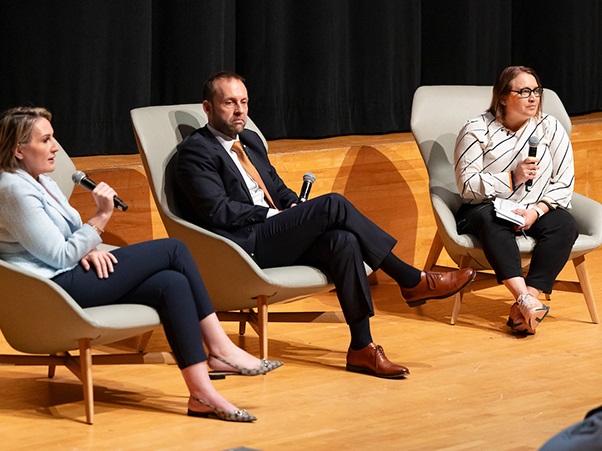On Democracy, Alumna Nuria Esparch Says ‘We, the People, Will Find Our Way Back’
December 9, 2024
She served as Peru’s minister of defense during a delicate time in the country’s history.
When Nuria Esparch was appointed Peru’s minister of defense in November of 2020, the country was grappling with the pandemic and a political crisis, having had three presidents in one week.

“President Sagasti assumed the immense challenge of leading our country in one of the most difficult political moments, amid the largest public health crisis in the world in the last 100 years,” recalled Esparch, who received an executive master of arts in public administration from Maxwell in 2000.
“As soon as he called me, I accepted the invitation to be back in the public service, which is my true calling.”
Sagasti had chosen a seasoned leader to support the transitional and emergency government. In addition to 15 years in the private sector, Esparch led six sectors of the Peruvian executive branch.
“I had to get to work right away because the assignment only lasted a few months,” said Esparch. In addition to the regular defense agenda, she carried out the vaccination of the armed forces and the distribution of vaccines across Peru. “That was a moment for managing complexity, ambiguity and multiple priorities,” she said.
That delicate chapter for Esparch, and for Peru, culminated with the election of leftist president Pedro Castillo, which prompted a failed effort by its veterans to incite a military coup. Esparch wrote about this and the historical involvement of Peru’s military in political affairs in a monograph for the Moynihan Institute of Global Affairs titled “Coups to Save Democracy.”
Peru and Latin America have a long history of military involvement in political life, where trust in most institutions is low but perceptions of the armed forces remain positive. Esparch said the level of trust for the armed forces almost doubles that of political parties and is largely higher than that granted to Congress.
“Only the Catholic Church is more trusted than the military among the Latin American population,” she added.
“I believe that when we take a situation to the extreme, common sense returns with force at a certain point. I strongly believe that we, the people, will find our way back to reasonableness and the defense of democracy.”
Nuria Esparch
According to the Economist Intelligence Unit, Peru now has a hybrid system of governance in which democratic elements coexist with features of authoritarianism. In 2022, it downgraded the country on its index from 6.9 (imperfect democracy) to 5.92 points following another failed coup attempt—this time by former President Castillo—as well as the inauguration of President Dina Boluarte amid widespread protests.
It’s a downward trend Esparch sees mirrored in other countries. “I believe that in Peru and in the world, confidence in democracy has been gradually weakening.
In the Peruvian case, I think that after the pandemic, we realized that the state was not providing citizens with services such as security, health, education, water,” she said, noting corruption and polarization caused by social media as contributing factors.
Esparch says she remains an optimist. “I believe that when we take a situation to the extreme, common sense returns with force at a certain point,” she said. “I strongly believe that we, the people, will find our way back to reasonableness and the defense of democracy.”
Today, Esparch is back in the private sector as senior manager of institutional relations at Southern Peru Copper Corp.
She also teaches Leadership in the Public Sector at Pontificia Universidad Católica del Perú.
“People always need the state to function, even in times where democracy is of low quality or there is a crisis,” said Esparch. “That is why it is so important to have a powerful civil service that can withstand the bad times.”
By Jessica Smith
Published in the Fall 2024 issue of the Maxwell Perspective
Related News
School News

Mar 26, 2025
School News

Mar 24, 2025
School News

Mar 21, 2025



